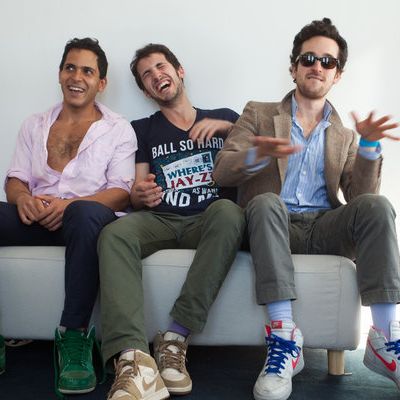
When Beth Schoenfeldt rolled up to the Williamsburg headquarters of Rap Genius one morning last year, she found the company’s headquarters in disarray: mattresses on the floor, computers strewn about, and not a soul to be found. Eventually, one of the inhabitants was roused from his sleep and apologized: “Drake dropped an album last night!”
Round-the-clock hacking sessions are standard fare for many tech start-ups. But Rap Genius, a vast compendium of hip-hop lyrics, decoded and annotated by its users, has some unusual administrative needs. Schoenfeldt, whose firm FundedBuy advises start-ups on these needs, sent her new clients a “start-up checklist” detailing requirements for health insurance, bookkeeping, a VOIP phone system, and the like. The response came back from one of the site’s employees: “Can you add weed to this?”
Fast-forward a few months. The Rap Genius guys are still sleeping on mattresses, but are also the recipients of a $15 million vote of confidence from one of Silicon Valley’s best-known venture capital firms. On Wednesday, Andreessen Horowitz announced that it was investing in the site, with ambitious plans to move beyond hip-hop lyrics and annotate just about everything on the web. Marc Andreessen said in a statement on the site (annotated, of course) that Rap Genius has the potential to “be knowledge about the knowledge” and to “create the Internet Talmud.”
Co-founder Tom Lehman, seated at a living room table near an E.L. Doctorow novel covered in cannabis, groused this week that Andreessen’s check had amounted to only “14.9998 and some change.”
“Isn’t that bullshit?” he asked.
The site was founded by Lehman, Mahbod Moghadam, and Ilan Zechory, classmates at Yale who had a brainstorm in the summer of 2009 over an examination of Cam’ron lyrics. After a summer at the Y-Combinator in 2011, Rap Genius emerged as the tech incubator’s fastest-growing company. It now boasts over 10 million unique visitors a month, delving into lines like Lil Wayne’s “real Gs move in silence like lasagna.”
Andreessen — whose portfolio includes virtually every heavyweight in the Valley — framed his latest investment within the mythopoeic genesis of the modern web.
“I often wonder how the Internet would have turned out differently if users had been able to annotate everything,” Andreessen wrote, recalling a feature that never made it into Mosaic, his seminal web browser. “And so, twenty years later, Rap Genius finally gives us the opportunity to find out.”
And then there’s the site’s “biggest homey,” Mark Zuckerberg, supposedly a frequent visitor. As proof, Moghadam offered up a Facebook message thread on his phone, where, yes, Zuck dropped an emoticon. “Facebook is like $50 billion, and our thing’s like ten times better than Facebook!” Moghadam boasted.
All the stars may be aligned, but how Rap Genius scales from “rap Wikipedia” to “Internet Talmud” remains to be seen. It’s unclear whether a site fueled by hip-hop obsessives can attract a completely different audience, united only by a desire to decipher the Internet’s endless content.
“The real question is where the site goes from here,” said Mark Lemley, a Stanford Law professor who taught Moghadam and annotated the Digital Millennium Copyright Act for Rap Genius. “There is plenty of room for growth in the genre, but you can imagine it becoming a sort of cultural Wikipedia that explains all kinds of things.”
The company has started adding literature alongside rap lyrics — there is an annotated copy of The Great Gatsby, for example, as well as nascent offerings in other verticals like Poetry Brain and Bible Genius. The challenge — and the opportunity — is to draw in a broader audience that has the same passion as the current users feel about rap.
“All the other start-ups approached it from the perspective of, ‘I want to annotate the web,’” Zechory said. The Ivy League grads who help edit the site were typing away, while the rapper Ab-Soul, who had been crashing at the Rap Genius headquarters, put the final touches on a joint he’d been rolling.
“For us, rap was great,” Zechory continued. “Starting with one thing where you can get the passionate community going is the best way to approach it.”





























